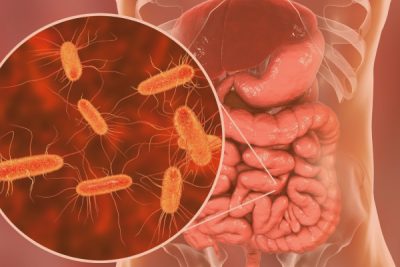Do you ever wonder how the foods that you eat can affect your skin? According to experts, your gut and skin are interlinked.
What Is The Gut-Skin Axis?
The gut is where we break down food, absorb nutrients, metabolize hormones, neutralize pathogens and their toxins, detoxify enzymes, and produce neurotransmitters and vitamins, necessary for overall health. A healthy gut is linked to better digestion, stronger immunity, and improved skin health.
The connection between the gut and skin connection is a two-way street. Not only can a healthy gut lead to better skin health, but skin health can also impact gut health.
If the gut flora is compromised for a period of time it is possible to develop “leaky gut” syndrome. The intestines become permeable and allow partially digested food to escape into the bloodstream. This leads to inflammation, which manifests on the skin.
Inflammation presents itself with symptoms including bloating/cramping, diarrhoea and sometimes blood in the stools. A study has reported that 70% of people with psoriasis also have digestive issues. About 15 to 20% of people with ulcerative colitis and up to 25 to 30% of those with Crohn’s have skin conditions.
Coeliac disease is an inflammatory disorder in people who develop an immune reaction to gluten. It is associated with intestinal symptoms, as well as skin conditions like dermatitis herpetiformis and psoriasis. Due to the gut-skin axis, inflammation in the gut can also result in inflammation in the skin.
The skin acts as a barrier that protects against bacteria, toxins, and other harmful substances such as free radicals. When this barrier is damaged, it can lead to an increase in inflammation, which can impact gut health.
The gut has a constant relationship with your skin: Although gastrointestinal (GI) issues in humans can vary greatly in severity, the skin can be a good indicator.
Skin Signs Of Unhealthy Gut
In the case of an unhealthy gut, the first signs might show up on your skin.
One way in which your gut microbiome affects your skin is via your immune system. Certain bacteria, and the substances they produce, promote accumulation of T cells that reduce inflammation.
Researchers have found that a microbial imbalance or lack of bacterial diversity in the gut precedes conditions such as chronic inflammation and eczema (atopic dermatitis) later in life. Early studies have also linked gut dysbiosis to skin microbiome imbalances.
Another way in which your gut microbes affects your skin is through nutrient availability and digestion. Dietary fibre cannot be digested by the enzymes produced in your gut. Bacteria, however, love the stuff! Fibre fermentation by gut bacteria leads to the production of short chain fatty acids (SCFA) which improve the fatty acid composition of your skin and your skin microbiome.
Here are a few skin conditions that may be indicate an unhealthy gut:
Gut health and acne
Several studies have reported that people with acne have a higher level of gut inflammation. The probiotic Lactobacillus paracasei can effectively lower inflammation and improve acne. Probiotics help maintain a healthy balance between good and bad gut bacteria.
Gut health and eczema
Eczema is a common skin condition that causes dry, itchy, and inflamed skin. It is often a sign of an underlying condition like asthma, allergies, or gut issues. Researchers have found that people with eczema have a higher level of gut inflammation than those without eczema. Treating gut inflammation may be an effective way to treat eczema.
Gut health and rosacea
Rosacea is a chronic skin condition that causes redness, bumps, and pimples on the face. It often starts with periods of blushing or flushing. Rosacea has been linked to gut problems such as small intestinal bacterial overgrowth (SIBO). In one study, 70% of people with rosacea also had SIBO. Treating gut problems may be an effective way to treat rosacea.
Gut health and psoriasis
Psoriasis is a chronic skin condition that causes red, scaly patches on the skin. It is thought to be caused by an overactive immune system. Psoriasis has been linked to gut problems like inflammatory bowel disease (IBD) and SIBO. A lot of people with psoriasis also had IBD. People who were treated for IBD saw their psoriasis symptoms improve.
Gut health and dull complexion
While an unhealthy gut can cause many skin disorders, it can also cause some unpleasant skin problems that can make you look dull, tired, and older. One of the main culprits behind dull complexion is inflammation, which as we know by now it is closely linked to gut problems. So, if you are struggling with a dull complexion, it might be a good idea to take a closer look at your gut health.
Gut health and wrinkles
Wrinkles are a natural part of aging, but they can also be a sign of an unhealthy gut. One study found that people with wrinkles had a higher level of gut inflammation than those without wrinkles. Improving gut health can lead to better skin health, and vice versa.
Gut health and dark circles under your eyes
If you are struggling with dark circles under your eyes, it might be a sign of gut problems. One study found that people with dark circles had a higher level of gut inflammation than those without dark circles. If you want to have beautiful skin and a radiant complexion, you must take care of it, not just from the outside but also from the inside, by having a healthy gut.
How To Improve Your Gut And Skin Health?
There are trillions of good and bad bacteria in the gut. Good bacteria help with digestion and absorption of nutrients, while bad bacteria can cause inflammation. The ratio of good to bad bacteria is important for gut health.
A Healthy diet for Healthy Skin
A diet high in unhealthy fats, processed foods, sugar, white bread, caffeine, and alcohol can upset this balance and lead to digestive problems. Simple sugars cause spikes in blood sugar and hormone levels.
Hormone imbalances can lead to an increase in sebum production which clogs pores and provides the perfect environment for acne-causing bacteria to grow. Plant-based diets and lean protein boost the gut microbiome.
- A diet rich in antioxidants and fibre can help improve gut health. High fibre foods beans, whole grains, fruits, and vegetables.
- Omega-3 fatty acids improve skin hydration and skin barrier function. They can be found in foods such as walnuts, fish, linseeds, and chia seeds.
- If you have acne-prone skin, consider lowering your dairy intake or swapping high-glycaemic index foods for less sugary alternatives. For example, you could replace white bread and white rice with wholemeal bread and brown rice.
- Linoleic acid can improve the consistency of sebum and acne symptoms. It can be added to your diet through vegetable oils, seeds, and nuts. Extra-virgin olive oil is the most gut-friendly oil.
- Make sure you get enough of skin-supporting nutrients vitamins A, C, E, K2, B3, B5 and minerals such as zinc, selenium, sulphur, and silica.
- Avoid known food allergies and anything you have identified as a food sensitivity or irritant.
Eat prebiotics and postbiotics to improve gut health
Prebiotics are a type of fibre that feeds the good bacteria in your gut such as Bifidobacteria. They are found in foods like bananas, onion, and garlic. Postbiotics are the beneficial compounds that are produced by gut bacteria when they break down prebiotics. Postbiotics have been shown to improve gut health and boost immunity.
Probiotics are live and beneficial bacteria (such as such as Lactobacilli) that are found in fermented foods such as yogurt, kimchi, kefir, sauerkraut, miso, and tempeh. The good bacteria help you break down food and absorb nutrients that can benefit both your general health and your skin.
Probiotic-rich foods are good sources of prebiotics and postbiotics. Look for probiotic supplements that contain a high number of CFUs (colony-forming units) and many different bacterial strains.
In addition to diet, factors such as sleep, stress, exercise, smoking, exposure to ultraviolet light, pollution, alcohol intake, antibiotic use, and emotions can also affect gut health.
The Bottom Line
Improve your gut health and you will notice your skin improve. A happy gut is important for glowing skin.













